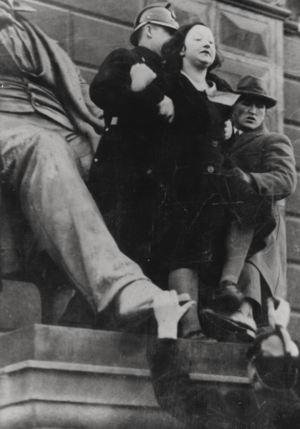Ragnhild Nikoline Andersen facts for kids
Ragnhild Nikoline Andersen (1907–1990) was a Danish woman who worked to improve conditions for workers. She was also a politician and a member of the Communist Party of Denmark. During World War II, when Germany occupied Denmark, she was sent to a very difficult camp called Stutthof concentration camp in Poland. She spent 20 months there before being rescued. After the war, she was elected to the Folketing, which is the Danish Parliament. She became an important member of her party and worked to improve women's rights.
Contents
Her Life Story
Early Years and Education
Ragnhild Nikoline Andersen was born on August 18, 1907, in a small place called Yderby in Denmark. Her father, Nikolaj Andreas Andersen, was a harbor master. Ragnhild was one of seven children, but she was the only one who got to go to school for a long time.
Moving to Copenhagen and Becoming an Activist
In 1925, when she was 18, Ragnhild moved to Copenhagen. She worked in offices for a while. She soon joined a youth group called Danmarks Kommunistike Ungdom, which was a communist youth movement. She also joined a trade union called HK. A trade union is a group that helps workers get fair pay and good working conditions.
Ragnhild was very active. She helped with a children's group called Unge Pionerere and edited their magazine starting in 1928. In 1929, she even went on a trip to the Soviet Union with a group of children. When she came back, she stopped working in offices. Instead, she started working in a radio factory as a metal worker. There, she joined another union, the Danish Women Workers' Union (KAD), and became an important member. She worked closely with other women, many of whom were also communists, like her friend Inger Gamburg.
Joining the Communist Party
In 1929, Ragnhild Andersen became a member of the Danish Communist Party. She was very active in the 1930s, taking part in many demonstrations and political events. Once, she even climbed onto a statue in Kongens Nytorv, a big square in Copenhagen, to speak to people. However, she was arrested for causing a disturbance.
Life During World War II
When Germany occupied Denmark during World War II, the Communist Party was made illegal. Ragnhild had to go into hiding. But she was soon arrested in September 1941 and sent to Vestre Prison and then to Horserød.
In October 1943, the Gestapo (the German secret police) sent her and six other communist women, along with 143 men, to Stutthof concentration camp near Gdansk in Poland. A concentration camp was a terrible place where people were held against their will and treated very badly. Ragnhild spent 20 difficult months there.
Thankfully, in 1945, after Denmark was freed at the end of the war, six of the seven women, including Ragnhild, were able to return home. Ragnhild wrote a book about her experiences called Vi blev reddet denne Gang (We were saved that time), which was published in 1945.
After the War and Political Career
In the autumn of 1945, Ragnhild Andersen was elected to the Folketing, the Danish Parliament. She was one of 18 communists elected that year. She was re-elected in 1947. At first, she represented the Frederiksborg area, but in 1950, she was elected to represent Copenhagen. She became a very important member of the Communist Party.
Ragnhild was especially focused on social issues. She worked hard to improve conditions for people who were struggling and spoke up for women's right to work part-time. She continued to run for the Communist Party, but she was not re-elected in later years. However, in 1968, she still received more votes than other communists on her party's list, even though she was listed as the third candidate.
Personal Life and Legacy
Ragnhild Andersen was married twice. In 1937, she married Finn Johannes Salemonsson, but they divorced in 1949. In 1952, she married another communist politician, Peter Alfred Jensen.
Ragnhild Andersen passed away in Copenhagen on May 8, 1990. She is buried in Vestre Cemetery. She is remembered for her dedication to workers' rights and her fight for social justice and women's rights in Denmark.


